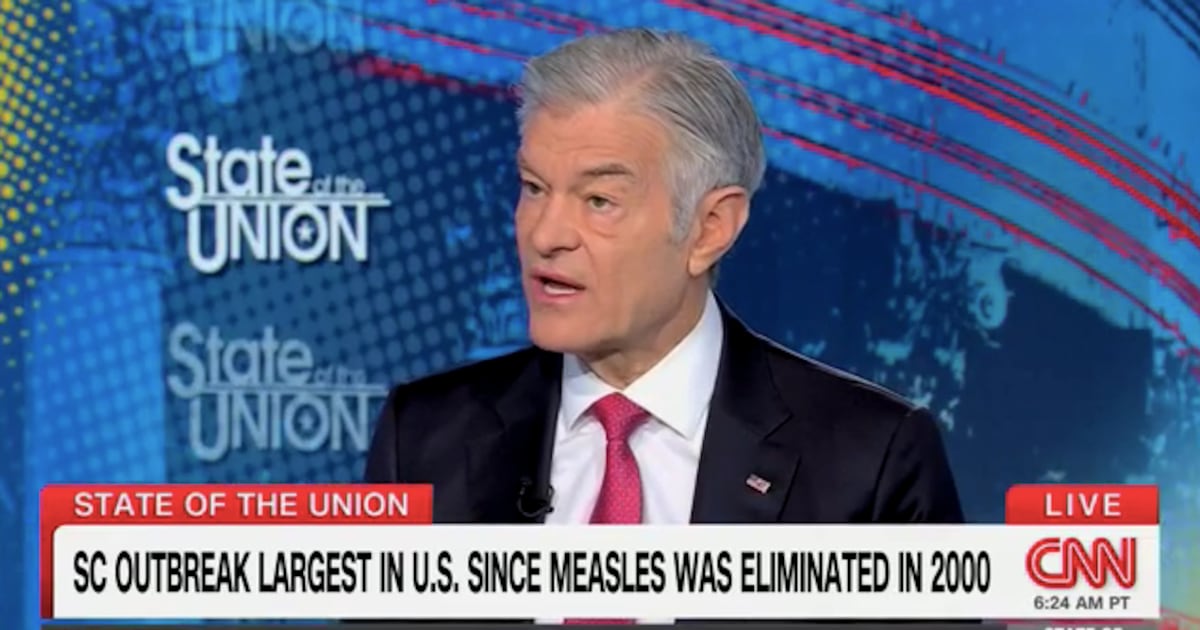One year after scrapping a program that had a near-perfect record of ensuring that asylum seekers would show up for mandatory check-ins with immigration officials and attend their court hearings, Immigration and Customs Enforcement (ICE) is standing by its decision to shut it down.
The Family Case Management Program (FCMP), as it was known, was not “removing” enough people, the agency said.
“The rates of compliance for FCMP were consistent with other monitoring options ICE exercises under Alternatives to Detention (ATD), which proved to be a much better use of limited resources,” ICE spokeswoman Sarah Rodriguez told The Daily Beast. “Additionally, removals of individuals on ATD occur at a much higher rate than the FCMP. Over the lifespan of FCMP, there were only 15 removals from this program, as opposed to more than 2,200 from ATD in the same period. There are no plans to reinstate the FCMP at this time.”
This comes as President Donald Trump signed an executive order on Wednesday requiring that families remain together while they await court proceedings for their asylum cases, after days of sustained bipartisan backlash because his “zero tolerance” policy led to the separation of children from their parents who cross the southern border illegally. But Democrats warned that while the order may have temporarily halted the practice of separating families at the border, the president’s decree could lead to the indefinite detention of those families.
Immigrant advocates have said the program’s cancellation last June laid the groundwork for the Trump administration’s “zero tolerance” policy before it was formally enacted two months ago. That policy has drawn sustained bipartisan backlash because it led to the separation of children from their parents who cross the southern border illegally.
“This administration terminated it, paid a fine to terminate the contract early,” said Michelle Brané, director of migrant rights and justice at the Women's Refugee Commission. “They have never answered why they terminated that program. It’s obvious they terminated it because they wanted to be able to say we have no other alternatives but to separate [families].”
And now, a bipartisan group of lawmakers is considering reinstating the FCMP.
Last year, ICE scrapped the program amid a series of budget cuts at the agency. Some immigration hardliners had argued that the program amounted to “catch and release,” a practice whereby individuals who cross into the country illegally are allowed to roam freely pending their hearings before an immigration court.
The FCMP, however, was 99 percent successful at ensuring that asylum seekers showed up for their check-ins with ICE, and 100 percent of all participants attended their court hearings. Perhaps more importantly to some lawmakers, the pilot program was viewed as a more humane way to deal with legitimate asylum requests.
“The answer isn’t keeping kids in prison, in detentions, for longer than 72 hours. The answer is what had already been in place in previous administrations and it was called family case management program,” said Sen. Chris Van Hollen (D-MD), one of the several Democratic lawmakers who have traveled to the border in recent days. “And it kept families together as they went through the asylum process.”
The FCMP was designed to allow asylum seekers to remain together as families while ensuring that they would show up for their court dates through strict monitoring and other services. It provided migrants and their families with education, health care and other consulting and legal services aimed at helping them navigate the asylum process. It was also cheaper than the average detention method. More than 600 families were enrolled in the program when it was axed.
“If there are alternatives that are better than detention, cheaper than detention, better for kids, and there’s a good track record of getting folks to show up, then that’s smart,” Sen. Tim Kaine (D-VA) told The Daily Beast.
Republican lawmakers including Sen. Lindsey Graham (R-S.C.) have argued that the agencies, including ICE, should find a way to keep families together while ensuring that they show up for their court hearings. Graham, a key negotiator on immigration legislation in the Senate, indicated that he would be willing to reinstate the FCMP, and he questioned the reasons for its closure in the first place.
“Some people may need to be detained—if this is the third time they’ve tried to do this,” Graham said in an interview. “If it’s the first time, maybe you would do the counseling-ankle bracelet thing. Give people different options and the discretion to use those options.”
He added sarcastically: “So that’s why we canceled it, right? It was working. That was stupid.”
Sen. Thom Tillis (R-N.C.), the lead author of Senate Republicans’ bill to end family separation and speed up the adjudication process, indicated to The Daily Beast that he was also open to the idea of reinstating the FCMP. A bipartisan group of senators is meeting on Monday to discuss a path forward.
“I’ve talked to Republican senators and they’re open. They want to find a way to avoid what they call catch-and-release. There are ways to do that short of separating children from parents, or detaining families,” Senate Minority Whip Dick Durbin (D-IL), who has long taken a lead role in the Senate’s immigration battles, told The Daily Beast. “It’s dramatically cheaper. It doesn’t look as mean and tough like what we’re currently doing.”
Lawmakers expect that Trump’s executive order will swiftly face court challenges, meaning that Congress must still act to codify the ban on family separations. Democrats have been calling on the Trump administration to end its “zero tolerance” policy which has led to the separation of families. But with Trump unlikely to reverse the policy, Senate Republicans will need Democratic support in order to clear the 60-vote threshold. It remains unclear whether enough Democrats are ready to play ball.
“The president continues an unresolved crisis of his own making by signing an executive order that will inevitably lead to the indefinite detention of whole families without identifying identifying where they will be detained, under what kinds of conditions, what is the path out of this—I’m not sure it’s a significant improvement,” Sen. Chris Coons (D-DE) said in an interview.
—Betsy Woodruff and Jackie Kucinich contributed reporting.






